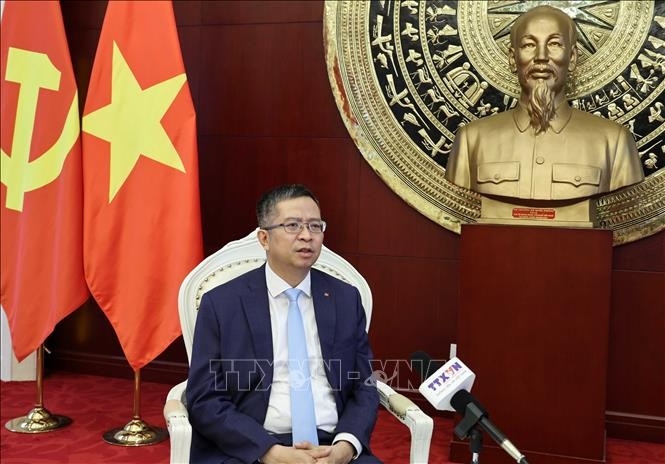Talking with the Vietnam News Agency (VNA)’s resident reporters in Beijing, Binh said the visit, made at the invitation of Chinese Party General Secretary and President Xi Jinping, carries important significance. It not only reviews a historic milestone but also reaffirms the fundamental values that have shaped the modern international order: peace, independence, sovereignty, equal cooperation, and mutual development.
Vietnam, having endured long and arduous struggles for national independence, understands more than most the value of freedom and peace, and deeply shares the losses and appreciates the great sacrifices made by nations in their fight against fascism, oppression, and exploitation, he said.
    |
 |
|
Vietnamese Ambassador to China Pham Thanh Binh |
The Vietnamese State President’s presence at the event underscores the country’s foreign policy of independence, self-reliance, diversification and multilateralization, along with its proactive, active, comprehensive, extensive and effective global integration. It highlights the country’s active and responsible contributions to peace, cooperation, and development in the region and the world.
Coupled with domestic celebrations of the 80th anniversary of August Revolution and Vietnam’s National Day on September 2, the visit amplifies Vietnam’s aspiration, will, and resolve to raise its sense of responsibility for safeguarding global and regional peace, for an environment of cooperation, development, and prosperity for humanity in the new era, Binh said.
President Cuong's working trip to China coincides with another official visit to Vietnam by Zhao Leji, member of the Standing Committee of the Political Bureau of the Communist Party of China and Chairman of the Standing Committee of the National People’s Congress (NPC). Zhao will attend the 80th anniversary of August Revolution and Vietnam’s National Day on September 2, and co-chair the first session of the cooperation committee between the Vietnamese National Assembly and the NPC. These reciprocal trips are a testament to the strong mutual support and the continuously reinforced political trust between the two Parties, States, and their people, the diplomat noted.
As part of his agenda, the Vietnamese President is scheduled to hold meetings with leaders of other countries and international organizations attending the anniversary. This will be an important opportunity for Vietnam to strengthen friendship and practical, multifaceted cooperation with key global and regional partners, while spreading the country’s images and its socio-economic achievements over the past 80 years. By doing so, Vietnam conveys a positive and reliable message about its people and progress.
With such significance, the State President’s attendance at the 80th anniversary of the victory over fascism in China not only demonstrates Vietnam’s special regard for its traditional neighborly ties and comprehensive strategic cooperative partnership with China, but also reaffirms the country’s consistent commitment to upholding the universal values of peace, advancing mutually beneficial cooperation, and contributing to the common prosperity of nations and people worldwide. At the same time, it reflects Vietnam’s determination, willpower, and strength in pursuing the goals of rapid and sustainable growth in the new era of national rise.
In the diplomat’s view, President Cuong’s first working visit to China in his capacity as head of state holds significance for Vietnam - China relations.
It demonstrates both countries’ commitment to further advancing their comprehensive strategic cooperative partnership and building a Vietnam - China Community with a shared future that carries strategic importance. It comes just four months after the successful state visit to Vietnam by Chinese Party General Secretary and President Xi Jinping in April this year, and follows the official Vietnam visit by Chairman Zhao from August 31 to September 2 to attend the 80th anniversary of August Revolution and National Day, and Prime Minister Pham Minh Chinh’s working trip to China to attend the expanded Shanghai Cooperation Organization (SCO) Summit from August 31 to September 1, marking the first time in the history of bilateral ties that three high-level visits have taken place almost simultaneously. This unprecedented exchange represents a new high point in top-level interactions, carrying great significance in the year celebrating the 75th anniversary of diplomatic ties and the Year of Vietnam–China Humanistic Exchange 2025.
During his stay, the Vietnamese leader is scheduled to hold talks and meetings with key Chinese leaders. The two sides are expected to outline major directions to effectively realize the common perceptions reached by the top leaders of the two Parties and countries. Discussions will focus on measures to further bolster political trust, manage and properly handle existing differences in bilateral ties, and lay the groundwork for more effective cooperation across all channels, levels, and fields.
On the occasion, they will also share views on each country’s situation, global and regional issues of shared concern. The two sides will deliberate ways to deepen cooperation and achieve more substantive outcomes, toward creating new breakthroughs in socio-economic collaboration by leveraging each other’s strengths for mutual benefit and delivering tangible gains for both nations and their people.
Their discussions will explore more people-to-people exchanges, and enhance cooperation in culture, tourism, and education. This includes joint efforts in quality human resource training and the effective “Red Journey” youth exchange aimed at raising young generations’ understanding of the bilateral relations and fostering the spirit of traditional friendship described as “both comrades and brothers.”
In conclusion, the diplomat said President Cuong’s visit is poised to add fresh momentum to the positive trajectory of Vietnam–China relations, including the building of a Vietnam–China community with a shared future that carries strategic significance under the six major orientations, thereby contributing to peace, stability, and enabling both countries to meet their development goals while also making contributions to regional development.
Source: VNA